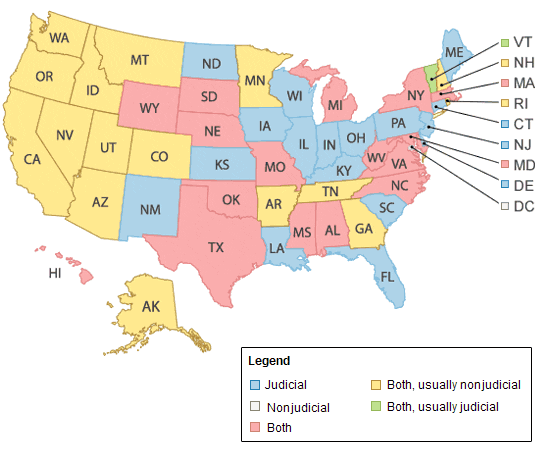If you are facing foreclosure, learn why you need to know if your state is judicial or nonjudicial
As those seeking foreclosure help in Orange County or Los Angeles may know, California is considered a nonjudicial state. Across the country, states are classified as judicial or nonjudicial based on how their foreclosures are processed. Many states process one-way or the other. California is a state that permits both.
A judicial foreclosure is processed through the courts. A nonjudicial foreclosure does not require court proceedings. Though states that permit nonjudicial foreclosures have different statutes, the homeowner generally receives a Notice of Default and a Notice of Sale from the lender. These documents are recorded at the county records office. If the default is not resolved, a public auction is held. Often, cash or cash equivalent is required from the bidders at auction.
For Southern California homeowners unable to secure a Los Angeles loan modification attorney or a Los Angeles foreclosure attorney in time, this is devastating. Though nonjudicial foreclosures have also benefitted the local housing market. As in Georgia, Arizona and Michigan, state statutes have allowed many foreclosures to work their way through the system faster.
A recent Housingwire story explained the growing difference between markets in judicial and nonjudicial states. As of June 2012, more than 60% of the nation’s foreclosures are in judicial states. Bank of America Merrill Lynch analysts cited the backlog of foreclosures building up in these states. It seems the nonjudicial states simply process quicker.
Foreclosures in judicial states can take years to process. The longest are New York (1019 days), New Jersey (964 days) and Florida (806 days). Though the housing bubbles of states such as California and Arizona were larger, nonjudicial states have been able clear bad loans more efficiently. Prices fell much further from their mid-2006 highs but a line of foreclosures is not slowing the recovery the same as in judicial states.
Things may have changed significantly in California though with the Homeowner Bill of Rights. Designed by Attorney General Kamala Harris, the bill was designed to combat dual-track foreclosures and robo-signing abuses. Now Los Angeles and Orange County homeowners in need of foreclosure help have another resource. They can challenge the lender’s right to foreclose.
The bill also requires single points of contact for the homeowner and imposes penalties for filing unverified documents. If it is believed that an action was taken without a servicer’s review, an experienced loan modification attorney in Los Angeles or the surrounding counties can sue the loan service firm.
Bob Jackson of Jackson & Associates in Irvine is concerned that the Homeowner Bill of Rights will have unintended consequences. Since there is more risk attached to nonjudicial filings, loan servicers may just start filing judicial foreclosures instead. “The Homeowner Bill of Rights is the most massive change in the last 100 years of real estate law,” Jackson said.
Now he may have a vested interest in arguing against the Homeowner Bill of Rights. Though he may also be right that the same efficiency that has allowed foreclosures to be processed so quickly will be hampered if California transforms into a more judicial foreclosure state.
